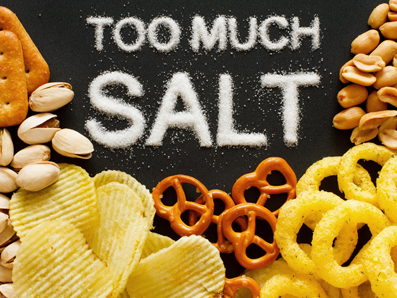
4. Food High in Salt Content Could Increase Diabetes risk |

![]() A metabolic condition called latent autoimmune diabetes in adults (LADA), which appears later in adulthood is often misdiagnosed as type 2 diabetes. LADA is a more slowly progressing disease compared to diabetes, and it does not initially require insulin treatment.
A metabolic condition called latent autoimmune diabetes in adults (LADA), which appears later in adulthood is often misdiagnosed as type 2 diabetes. LADA is a more slowly progressing disease compared to diabetes, and it does not initially require insulin treatment.
![]() A new study conducted by Dr. Bahareh Rasouli, of the Institute of Environmental Medicine at the Karolinska Institutet in Stockholm, Sweden - in collaboration with researchers from other Swedish and Finnish institutions - checked the impact of sodium intake on the risk of type 2 diabetes and LADA.
A new study conducted by Dr. Bahareh Rasouli, of the Institute of Environmental Medicine at the Karolinska Institutet in Stockholm, Sweden - in collaboration with researchers from other Swedish and Finnish institutions - checked the impact of sodium intake on the risk of type 2 diabetes and LADA.
![]() The researchers have presented their findings at the annual meeting of the European Association for the Study of Diabetes, held in Lisbon, Portugal. Research had already suggested that the sodium we usually absorb from our daily intake of salt may significantly increase the risk of developing type 2 diabetes. The team explains that this may be because sodium impacts insulin resistance, well as excess salt can lead to hypertension and gaining excess weight. But until now, no studies had looked at the impact of sodium intake on the risk of LADA.
The researchers have presented their findings at the annual meeting of the European Association for the Study of Diabetes, held in Lisbon, Portugal. Research had already suggested that the sodium we usually absorb from our daily intake of salt may significantly increase the risk of developing type 2 diabetes. The team explains that this may be because sodium impacts insulin resistance, well as excess salt can lead to hypertension and gaining excess weight. But until now, no studies had looked at the impact of sodium intake on the risk of LADA.
![]() "Given the autoimmune component of LADA," "we hypothesized that a high-salt diet may accelerate autoimmunity and play a role in the pathogenesis [disease development] of LADA.
Also, there are limited data on the association between sodium intake and the risk of type 2 diabetes. Therefore, we aimed to study the risk of LADA and type 2 diabetes in relation to sodium intake." says Dr. Rasouli.
"Given the autoimmune component of LADA," "we hypothesized that a high-salt diet may accelerate autoimmunity and play a role in the pathogenesis [disease development] of LADA.
Also, there are limited data on the association between sodium intake and the risk of type 2 diabetes. Therefore, we aimed to study the risk of LADA and type 2 diabetes in relation to sodium intake." says Dr. Rasouli.
![]() Dr. Rasouli and colleagues analyzed data from the Epidemiological Study of Risk Factors for LADA and Type 2 Diabetes, which is a large Swedish cohort study. The team looked at data from 355 people diagnosed with LADA and 1,136 individuals with type 2 diabetes, comparing the results of this analysis with the findings from a healthy group of 1,379 individuals (the controls).
Dr. Rasouli and colleagues analyzed data from the Epidemiological Study of Risk Factors for LADA and Type 2 Diabetes, which is a large Swedish cohort study. The team looked at data from 355 people diagnosed with LADA and 1,136 individuals with type 2 diabetes, comparing the results of this analysis with the findings from a healthy group of 1,379 individuals (the controls).
![]() The researchers found that each extra gram of sodium (or 2.5 grams of salt) per day was linked to a 43 percent higher risk of type 2 diabetes. For LADA, each extra gram of sodium led to a 73 percent increase in developing the condition.
People with a high genetic risk of diabetes who also had a high daily sodium intake were almost four times as likely to develop LADA than people with a low daily intake of sodium.
The researchers found that each extra gram of sodium (or 2.5 grams of salt) per day was linked to a 43 percent higher risk of type 2 diabetes. For LADA, each extra gram of sodium led to a 73 percent increase in developing the condition.
People with a high genetic risk of diabetes who also had a high daily sodium intake were almost four times as likely to develop LADA than people with a low daily intake of sodium.
![]() People with a high genetic risk of diabetes who also had a high daily sodium intake were almost four times more likely to develop LADA than people with a low daily intake of sodium.
People with a high genetic risk of diabetes who also had a high daily sodium intake were almost four times more likely to develop LADA than people with a low daily intake of sodium.
![]() Based on these findings, the researchers "confirm an association between sodium intake and type 2 diabetes." They add that "high sodium intake may be a risk factor for LADA, especially in carriers of high risk HLA [human leukocyte antigen] genotypes." These are people who already carry a significant genetic risk of diabetes.
Based on these findings, the researchers "confirm an association between sodium intake and type 2 diabetes." They add that "high sodium intake may be a risk factor for LADA, especially in carriers of high risk HLA [human leukocyte antigen] genotypes." These are people who already carry a significant genetic risk of diabetes.
For enquiries info@jothydev.net.
Please visit: jothydev.net | research.jothydev.com | diabscreenkerala.net | jothydev.com/newsletter
